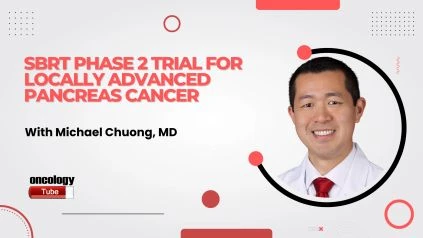Michael Chuong, MD, from Baptist Health has conducted a Phase 2 trial on the use of ablative MRI-guided stereotactic body radiation therapy (SBRT) combined with tumor treating fields (TTF) for the treatment of locally advanced pancreas cancer.
The study aimed to evaluate the effectiveness and safety of this novel approach in improving outcomes for patients with this challenging disease.
Pancreas cancer is known for its aggressive nature and limited treatment options, particularly in locally advanced cases where the tumor has spread to nearby tissues and organs.
Traditional treatment approaches such as surgery and chemotherapy have shown limited success in achieving long-term survival.
Therefore, alternative strategies are urgently needed to improve patient outcomes.
Dr. Chuong’s study utilized ablative MRI-guided SBRT, a precise and targeted form of radiation therapy that delivers high doses of radiation to the tumor while minimizing damage to surrounding healthy tissues.
This approach has shown promising results in other cancer types, and its application in pancreas cancer is a novel and innovative concept.
Furthermore, the study incorporated tumor treating fields (TTF), a therapy that utilizes low-intensity electrical fields to disrupt the division of cancer cells.
By combining TTF with ablative SBRT, Dr. Chuong aimed to enhance the therapeutic effect and potentially improve patient outcomes.
The Phase 2 trial enrolled a cohort of patients with locally advanced pancreas cancer who were not eligible for surgery.
The participants received ablative MRI-guided SBRT in combination with TTF therapy.
The primary endpoints of the study included overall survival, progression-free survival, and treatment-related toxicity.
Preliminary findings from the trial have shown promising results. The combination therapy demonstrated favorable outcomes in terms of survival rates, with some patients achieving long-term disease control.
Additionally, the treatment was well-tolerated, with minimal side effects reported.
These results suggest that ablative MRI-guided SBRT in combination with TTF holds potential as a safe and effective treatment approach for locally advanced pancreas cancer.
Dr. Chuong’s study represents an important step forward in the management of locally advanced pancreas cancer.
The results indicate that this innovative combination therapy has the potential to improve patient outcomes and may provide a new treatment option for a disease with limited therapeutic options.
Further research and larger-scale clinical trials are warranted to validate these findings and establish the optimal protocol for integrating ablative MRI-guided SBRT and TTF into standard clinical practice.
If successful, this approach could significantly impact the treatment landscape for patients with locally advanced pancreas cancer, offering hope for improved survival and quality of life.

